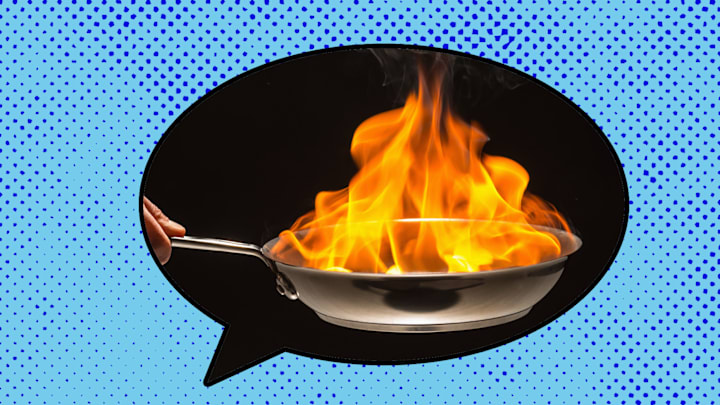“Many thought Alanis Morissette’s Jagged Little Pill was just a flash-in-the-pan after it entered [the] Southern California pop chart at No. 10 last week,” wrote the Los Angeles Times in 1995. “But the young Canadian singer’s album is gathering steam, jumping to No. 5.”
That was putting it mildly. Jagged Little Pill not only took off—it sold more than 10 million copies in 1996 and another 20 million in the decades that followed. It was the antithesis of flash in the pan, an idiom that’s come to be associated with some sort of fleeting fad, trend, or momentary excitement. Beanie Babies were a flash in the pan; so was Vanilla Ice.
If you thought the term came from cooking terminology, it’s a good guess—but that’s not quite it.
The Origins of “Flash in the Pan”
According to the Oxford English Dictionary, the literal meaning of flash in the pan dates to the late 1600s and refers to a misfiring weapon. When the gunpowder of a firearm was ignited without resulting in a discharge, it was said to be a flash in the pan.
Early guns dating to the 1300s had to be manually ignited by holding a flame to the powder in the barrel. Matchlock guns, which came later, could be fired mechanically. Then, in the improved flintlock design for muskets and other weapons, the pan was where the powder would be primed, with a lid that would be moved only when it was time to fire. These early firearms had their priming powder on the outside of the barrel; firing would result in sparks that would ignite the powder.
This worked in theory. Sometimes, the fire wouldn’t carry on to the powder in the barrel, and a “flash” in the gun’s pan had no effect. Therefore, a flash in the pan with no projectile was much ado about nothing.
The OED notes that the phrase took on a figurative meaning by the 1800s to describe a situation in which something big was expected, only to have it fail to go off (or ignite). And Green’s Dictionary of Slang states that flash in the pan had other meanings in the 1700s: an “incompetent, useless person” and an “abortive effort or outburst,” among others.
The Flash That Didn’t Pan Out
While the phrase originates with firearms, there have been some alternative explanations over the years. One theory was that gold prospectors searching in streams might have grown excited over seeing a shiny object in a pan and believed it was gold, only to be disappointed—it was merely a you-know-what.
After language columnist William Morris proffered the firearm explanation in 1959, a reader chided him to “do better than that” and proceeded to offer the gold rush origin. Morris replied that the flintlock pre-dated the 1800s gold rush, and the explanation therefore made little sense. But the phrase it didn’t pan out probably came from those entrepreneurial souls.
Gunpowder also birthed another phrase: keep your powder dry, or keep a cool head. It was sage advice for soldiers who carried combustible materials with them and needed to be sure it didn’t get wet. Lord Protector of England Oliver Cromwell may have coined the phrase by admonishing his men to “Put your trust in God, my boys, but mind to keep your powder dry.”
Cromwell himself was no flash in the pan. After a posthumous hanging by his political rivals, he was beheaded and his cranium was displayed for over 30 years. It was the whole resting in peace portion that didn’t quite pan out.
Have you got a Big Question you'd like us to answer? If so, let us know by emailing us at bigquestions@mentalfloss.com.
Read More About Words:
